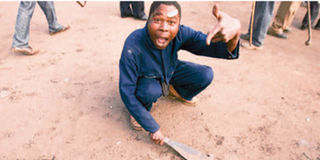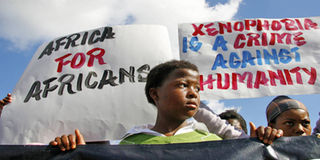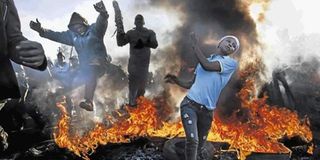Xenophobia in South Africa: Part 1: The Face of Suffering
Gladys holds her head in her hands, her rising and falling shoulders giving away her quiet sobbing, which she tries to hide from the world.
Gladys, in her late 40s, was born in Zimbabwe and never had any intention of leaving until a collapsed economy and political oppression forced her out, with South Africa offering hope that she might make a living here.
She left Harare after the police during Robert Mugabe’s regime raided the street-side informal trading centre in that city, where stalls were trashed, goods seized, people beaten and detained, and her hopes of providing for her young family dashed.
The immigrant appears in a social media post, shared many times and shot, by appearances, on a shaky hand-held cellphone in the wake of yet another bout of xenophobic attacks on small-scale foreigner-owned businesses in greater Johannesburg.
She does not respond initially to questions from the video-maker, which are indistinct amid background noise, police sirens and a milling crowd of onlookers.
When she answers, it is in a trembling uncertain voice, often mumbled and mainly in one or just a few words at a time.
A man sharpens his machete during clashes believed to be linked to recent anti-foreigner violence in South Africa. PHOTO | AFP
"They (xenophobic mob) took everything," she says in English, her Shona accent marking her out as a Zimbabwean.
She seems completely overwhelmed by the events, confused and tearful, and does not answer questions posed in isiXhosa or isiZulu.
In each case, she gives her first name, her home town and the fact that this is not the first attack she has endured.
Asked if she will go back to Zimbabwe after this latest incident of xenophobia, she simply shakes her bowed head repeatedly as she holds her face in her hands, just as she was doing when the video-maker first approached her, and says no more.
Gladys’ story mirrors that of many of the estimated five million other Africans who have come to South Africa, the largest group of about half that figure coming from Zimbabwe.
Gladys entered South Africa (SA) more than a decade and a half ago, leaving her three children in the care of their grandparents in a village near Harare. She made her way to Johannesburg, where she found herself alone in a sea of strangers.
"I did not know anyone. It was very hard," says Gladys, drawing in ragged breaths and fighting back tears.
Demonstrators take cover from a stun grenade and tear gas after a skirmish between locals and foreign nationals as thousands of people take part in the "peace march" against xenophobia in Durban, South Africa, on April 16, 2015. AFP PHOTO / STRINGER
But she found other members of the growing 'African diaspora', many of whom fled conflict, climate change-driven collapses of ancient traditional lifestyles and lack of economic opportunities in their home countries.
She found a community of fellow Zimbabweans, a place to live in Soweto, south of Johannesburg, and even some fellow members of the church group she had been part of in Harare.
"It was much better when I found Zimbabwean people who helped me," she says.
They helped Gladys find her feet, showed her where to buy goods for resale from a mass wholesaler and where some of them traded from the street side, much as she had done back in Harare.
For the first time in years, she had real hope, and her fears and constant dread of authorities clamping down on her livelihood faded.
"I felt safe then. I was hopeful for my life and my children’s lives," she adds.
Locals bought from her, despite her nationality, and Gladys, a Shona speaker, learnt more of both isiXhosa and isiZulu, closely related Nguni languages that are similar to the Zulu-based isiNdebele spoken by the Matabele of southern Zimbabwe to which she had been exposed in her homeland.
"I learnt a little (isiNdebele) at school. I have learnt more now, and also isiXhosa," she says.
The businesswoman tried to adapt to what she assumed would become her new homeland and, when she could afford it, sent for her children, who came to live with her in Johannesburg.
And then the troubles started.
At first, it was the Somalis who were targeted, populist local politicians claiming the "foreigners are taking our jobs".
But after several 'spaza' shops, usually constructed from recycled shipping containers, had been looted and burnt, the mob turned on anyone "not South African".
In a single day, much like the Somalis, Congolese, Malawians and other Africans from outside SA who were targeted, she lost everything she had built up as her daily trading stock.
It was a huge blow— and not the only one she received.
When the mob came, appeals to "just let me live and keep my things" were met with jeers and a severe clubbing that left her with a streaming head wound, blood winding its way down her tear-stained face.
Her pleas for mercy in both isiXhosa and isiZulu were ignored, with some of her attackers shouting at her: "You foreigners must all go home. You are stealing our jobs and money."
"I tried to speak (to them). I asked them to be kind, to not take my things. They did not listen, only shouting that I must go home and hitting (me)."
She and many others have endured savage attacks under that same mistaken belief that foreigners have taken South Africans’ jobs and money.
Scores have been killed, hundreds maimed and thousands of micro-businesses destroyed.
The problem for Gladys and others like her is that there is no way "home", and that SA, which has become their "home", is not always welcoming.
For many, there is nowhere to run back to – and for Gladys, the option of life under Mugabe was unthinkable.
So, like many others, she resigned herself to enduring the xenophobia that plagues South African society from time to time.
She waited until tensions calmed after police intervened to restore order and returned to trading, using the sale of some of her meagre personal goods like an old TV set and a tiny fridge to restock her roadside business.
An anti-xenophobia activist stands chained in front of a banner, as thousands of people get ready to march against the recent wave of xenophobic attacks in South Africa through the streets of Johannesburg CBD on April 23, 2015. AFP PHOTO/GIANLUIGI GUERCIA
"I had to sell nearly everything I had to start again," she says, the sobbing returning with this memory.
In the 17 years she has lived in SA, Gladys has endured three bouts of xenophobia, but still thinks life is better here than "back home", where President Emmerson Mnangagwa has not overseen much of an economic recovery after Mugabe's ouster in 2017.
"I cannot go back – it’s still the same and there is no money there."
Like many other Africans, Gladys is caught between the impossibilities of going back home and the difficulties of staying in SA, as many lack the documents to allow them to live and work here.
They cannot appeal directly to authorities if they are attacked in their businesses or homes, fearing deportation back to somewhere much worse.
And so they endure, sending money home to impoverished families when they can, fearing the waves of destruction and violence in the spasms of xenophobia that afflict this land every few years.
Gladys, who did not give her family name for fear of reprisals, has no idea whether there will be another bout of violence against foreign traders and business owners.
"I am afraid all the time. They can come again," she says.
Her anxiety is borne out by the recent emergence of what seems to be a grassroots anti-foreigner movement, called Operation Dudula, a Zulu term meaning "push back", and believes this is a sign of more to come.
Thousands march against the recent wave of xenophobic attacks in South Africa through the streets of Johannesburg on April 23, 2015, as demonstrators sang songs denouncing xenophobia and carried banners that read "We are all Africans". AFP PHOTO/GIANLUIGI GUERCIA
Two months ago, Operation Dudula 'activists', ostensibly seeking out "undocumented foreigners", launched a series of attacks on foreigner-owned businesses operators, including micro-businesses like Gladys', in townships around Johannesburg.
"Every day is scary. We do not know when they will come for us. But we have no option. I cannot stop them – they always come in groups. So, I will pray to God and hope that I will not be next."
Police were sent into Alexandra township – located near some of the most valuable properties on the continent but which is a crowded, high-density settlement riven by violence and poverty – where foreign traders like Gladys have been unable to trade for over two months.
Determined to face down their latest tormentors, traders from over a dozen Africa countries have sworn to take back their trading locations, many at or near the township's famous Pan African Mall, where goods from around the continent can be found.
Some of those traders have said they are prepared to fight "and, if necessary, die" in order to reclaim their only hope of avoiding pennilessness and devastation for their families and dependents.
Said one, David, from the DRC: "Why? Why are we being attacked? We sell goods. Some (of us) sell vegetables, which are much more expensive in the supermarkets. We are just trying to live. Can they not see we are poor Africans, just like they are? Why is there such hatred for us?"
David's question is echoed by political analysts, academics and sociologists who have delved into a socio-economic problem that has its roots in a history of centuries of colonialism.
Despite repeated investigations, involvement of government ministers, calls by President Cyril Ramaphosa to South Africans to live peacefully with their fellow Africans and attempted interventions by religious and community leaders, the threat of xenophobia seems to have become a permanent aspect of being a black foreigner here.
Malian singer Salif Keita writes a message on anti-xenophobia banner during the annual Awesome Africa International Arts Festival held at the Natal Playhouse in Durban on April 26, 2015. The festival themed " Speak Out Against Xenophobia" was sold out. AFP PHOTO/RAJESH JANTILA
The xenophobia, whenever it appears, is usually quickly ended, with subsequent calls for official action.
Non-governmental organisations provide emergency food, clothing and sometimes funding to soften the blow on those attacked and help them restart their businesses.
But the calls sound hollow, the help is partial and the threat of yet more xenophobia only receding for a time before it raises its head yet again. BY DAILY NATION















Post a Comment